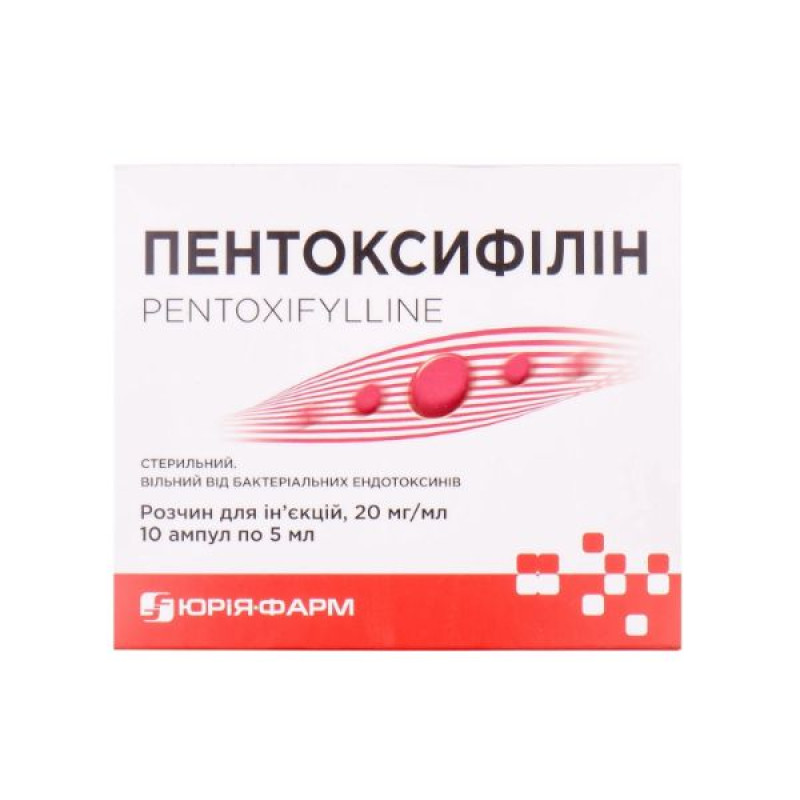Pentoxifylline solution for injection 2% ampoule 5 ml No. 10

Pentoxifylline injection solution is used for the following indications:
atherosclerotic encephalopathy; ischemic cerebral stroke; dyscirculatory encephalopathy; peripheral circulatory disorders caused by atherosclerosis, diabetes mellitus (including diabetic angiopathy), inflammation; trophic disorders in tissues associated with damage to veins or impaired microcirculation (postthrombophlebitic syndrome, trophic ulcers, gangrene, frostbite); obliterating endarteritis; angioneuropathy (Raynaud's disease); circulatory disorders of the eye (acute, subacute, chronic circulatory insufficiency in the retina and choroid of the eye); disorders of the function of the inner ear of vascular genesis, which are accompanied by hearing loss.Composition
The active substance is pentoxifylline (1 ml of solution contains 20 mg of pentoxifylline).
Excipients: sodium chloride, water for injections.
Contraindication
Hypersensitivity to pentoxifylline, other methylxanthines or to any of the excipients of the drug; massive bleeding (risk of increased bleeding); extensive retinal hemorrhage, cerebral hemorrhage (risk of increased bleeding); if retinal hemorrhage occurs during treatment with pentoxifylline, the drug should be discontinued immediately; acute period of myocardial infarction; gastric ulcer and/or intestinal ulcers; hemorrhagic diathesis.Method of application
Pentoxifylline is prescribed for infusions and slow intravenous injections.
Intravenous infusions are the most effective and well-tolerated forms of parenteral administration of the drug. The dosage regimen is determined by the doctor and depends on the severity of circulatory disorders, body weight and tolerability of treatment.
The following treatment regimens are recommended for adults:
Intravenous infusion of 100-600 mg of pentoxifylline in 100-500 ml of Ringer's lactate solution, 0.9% sodium chloride solution or 5% glucose solution 1-2 times a day. The duration of intravenous drip infusion is 60-360 minutes, i.e. the administration of 100 mg of pentoxifylline should last at least 60 minutes. The infusion can be supplemented with oral administration of pentoxifylline (400 mg) with the calculation that the maximum daily dose (infusion and oral) is 1200 mg. In severe condition of the patient (especially with constant pain, gangrene or trophic ulcers) it is possible to carry out an infusion of the drug "Pentoxifylline" for 24 hours. With this administration scheme, the dose should be determined at the rate of 0.6 mg / kg / h. The daily dose calculated in this way for a patient with a body weight of 70 kg is 1000 mg, for a patient with a body weight of 80 kg - 1150 mg. Regardless of the patient's body weight, the maximum daily dose is 1200 mg. The volume of infusion solutions is calculated individually, taking into account concomitant diseases, the patient's condition and is on average 1-1.5 l per day. In some cases, the drug can be used by intravenous injection of 5 ml (100 mg). The injection should be performed slowly, within 5 minutes, the patient's position - lying down.The duration of the parenteral course is determined by the treating physician. After the patient's condition improves, it is recommended to continue treatment using the tablet form of pentoxifylline.
Application features
Pregnant women
There is insufficient experience with the use of the drug in pregnant women. Therefore, prescribing Pentoxifylline during pregnancy is not recommended.
Pentoxifylline passes into breast milk in small amounts. Breastfeeding should be discontinued if this drug is prescribed.
Children
There is no experience with the use of the drug "Pentoxifylline" in children.
Drivers
The drug does not affect the reaction speed when driving vehicles or other mechanisms.
Overdose
Initial symptoms of acute overdose with pentoxifylline are nausea, dizziness or decreased blood pressure. In addition, symptoms such as fever, agitation, hot flashes, tachycardia, loss of consciousness, areflexia, arrhythmia, tonic-clonic seizures and vomitus in the form of "coffee grounds" as a sign of gastrointestinal bleeding may develop.
Treatment of overdose: In order to treat acute overdose and prevent complications, general and specific intensive medical observation and therapeutic measures are necessary.
Side effects
From the cardiovascular system: arrhythmia, tachycardia, angina pectoris, decreased blood pressure, increased blood pressure, feeling of heat (hot flashes), bleeding, edema.
From the hematopoietic and lymphatic system: thrombocytopenia with thrombocytopenic purpura and aplastic anemia (partial or complete cessation of the formation of all blood cells, pancytopenia), which can have fatal consequences, leukopenia / neutropenia.
Nervous system: dizziness, headache, aseptic meningitis, tremor, paresthesia, convulsions.
Gastrointestinal tract: gastrointestinal disorders, feeling of pressure in the stomach, flatulence, nausea, vomiting, diarrhea, constipation, hypersalivation.
Skin and subcutaneous tissue disorders: itching, skin redness and urticaria, toxic epidermal necrolysis and Stevens-Johnson syndrome, rash.
Immune system disorders: anaphylactic reactions, anaphylactoid reactions, angioedema, bronchospasm and anaphylactic shock.
On the part of the digestive system: intrahepatic cholestasis.
From the organs of vision: visual impairment, conjunctivitis, retinal hemorrhages, retinal detachment.
Storage conditions
Store in the original packaging at a temperature not exceeding 25 °C, out of the reach of children.
Shelf life - 2 years.
There are no reviews for this product.
There are no reviews for this product, be the first to leave your review.
No questions about this product, be the first and ask your question.



